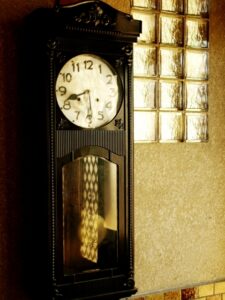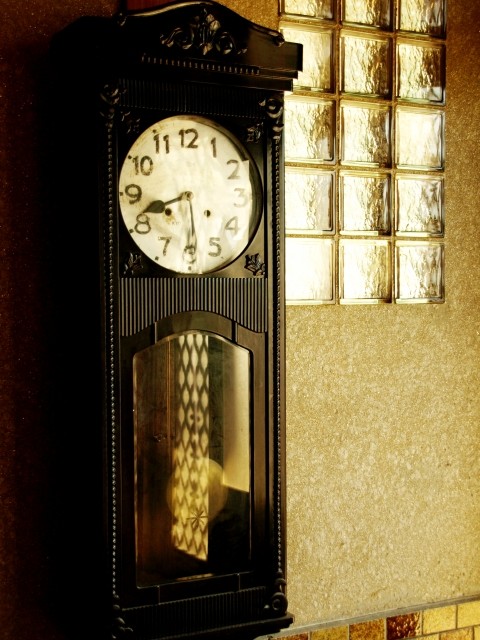12/23 の『高校生から始める「現代英語」』の放送を聞いての勉強内容です。
| 🔴 今回の「現代英語」では、特別企画 – Winter Special として 2回にわたり( Day 1, Day 2 ) “Grandfather’s Clock”(歌って学ぶ英語の名曲「おじいさんの時計」)を取り上げます。 ※日本では「大きな古時計」というタイトルで広く知られています。 |
Day 1 – My grandfather’s clock was too large for the shelf.
Opening その他で
Hannah Grace の部分だけピックアップしました。
● Opening
– Hi, I’m Hannah Grace. Thanks for joining us.
● “Grandfather’s Clock” について一言
– It’s a lovely song about an old man and his treasured clock.
And it sort of celebrates see old man’s life.
● “Grandfather’s Clock” の録音で
– I didn’t really know the song before we recorded for
the program. But when I really listened to it, it became
a very beautiful special song to me too.
– I hope you enjoy it!
● “Grandfather’s Clock” を聴き終わった後で
– Even though it’s a song, but it says the old man died.
It’s not really a sad song because it celebrates a wonderful
beloved grandfather and a wonderful life that he lived.
– And we’ve been going through some hard times as the world
together and in Japan. So I hope that this is a song that is
comforting and to listen to and to sing.
– I know it comforts me.
● 解説終了後
– I hope that you can feel the emotion of this song
even more since you understand the English lyrics now.
● 最後に
– I hope that the English version of the song becomes
a speciality used to me. Join us next time!

“Grandfather’s Clock” by Henry Clay Work
□作詞・作曲はアメリカのヘンリー・クレイ・ワーク (1832 – 1884) で
・1876年にこの曲を発表
・今でいうミリオン・セラーになったようです
□ “Grandfather’s Clock” のストーリー
・ある孫が、祖父が所有していた大きな古時計についての回想
▶︎「人の一生」をテーマ
・サビの部分で dies という言葉が繰り返し出てくるが…
▶︎ ユーモアもあり、「おじいさん」も充実した人生を送って亡くなるので、
特に悲壮感な感じはありません。
Words and Phrases
① clock
👉時計、携帯用の時計(watch)ではない「振り子時計」や「置き時計」
② pennyweight
👉[重量単位]ペニーウェイト=およそ 1.555グラム
解説の中でチェック!
【歌詞の特徴】
| ・行の最初の1字はすベて大文字 ・2行を1つにつなげてみると1つの文になり、意味がわかりやすくなる。 ※詞や歌詞では、4行を基本的な単位としているものが多い。 ※また、1つの文を2行に分けて書いてあるのが特徴 |
【第1節】
🟠 It was taller by half than the old man himself,
Though it weighed not a pennyweight more.
・taller by half は「背が半分だけ高い」
▶︎「おじいさん」の背丈の半分だけ時計の背がさらに高いようです。
– おそらく2m 以上の高さの時計のようです。
・the old man は直前の grandfather を受けて「おじいさん」
といった、親しみを込めた表現
・it weighed not a pennyweight more は…
it did not weigh a pennyweight more (than the old man’s weight)
「それの重さは(おじいさんの体重よりも)1ペニー分も重くはなかった」
という意味。
▶︎ weighed not の表現は、「強い否定」
🟠 It was bought on the morn of the day that he was born,
・morn は morning を意味する「詩語」。
▶︎直後の born と -orn の音が共通していて、一種の韻となっている。
【中間韻 (internal rhyme)】morn – born
🟠 But it stopped short, never to go again,
When the old man died.
・stopped short は、s の音が連続して印象的です。
▶︎単語の頭が同じ音である単語を並べて、韻を踏んでいる。
【頭韻 (alliteration)】stopped – short
・short は、ここでは「途中で」「急に」
・never to は「決して(もうこれからは)〜しない」です。
▶︎ never to go again は「決して(時計の針が)再び進むことはなかった」
つまり「それからはもう二度と(時計が)動くことはなかった」という
結果を表す
【リフレーン】
🟠 Ninety years without slumbering, tick, tock, tick, tock,
His life seconds numbering, tick, tock, tick, tock,
・日本語版では、90歳(ninety years)ではなく「百年- 100歳」としたものが有名
・slumbering と numbering は、音が似ていて共鳴【中間韻】
▶︎ slumber は sleep の文語「(安らかに)眠る、まどろむ」
▶︎ number の後に目的語がないのは、韻を踏ませるための語順
– 実際は、時計が (was) numbering his life seconds「彼の人生の秒(時間)を
数えていた」
・tick, tock, tick, tock は、時計の秒針 (second hand) が進む時の音
【擬音語】です。
反訳トレーニング 〜歌の出だしを覚えよう
【日本語】
▶︎[何が]:私の祖父の時計は
▶︎[どうだ]:〜でした / 大きすぎた / 棚には
▶︎[だから]:だから / それは – 立っていた / 90年間 / 床の上に
🔴これを日本語に合わせて英語にしていきます。
👉 My grandfather’s clock [どうだ]
👉 was too large for the shelf, [だから…]
👉 So it stood ninety years on the floor.
| My grandfather’s clock 👉 was too large for the shelf, 👉 So it stood ninety years on the floor. |
※「私の祖父の時は、棚には大きすぎた、だからそれは立っていた、90年間、床の上に。」
◎テキストと日本語の並びを変えています。
Discussion から – A Song of Love
🔵 Even though the old man dies, I wanted it to be a song that
would soothe his spirit as he goes to sleep for the last time.
・even though は「〜であるのに、〜ではあるが」
▶︎ the old man は「歌詞に出てきた[おじいさん]」
-「あのおじいさんは亡くなりますが」
・次の文は、I want 目的語 (it)+to 不定詞 (to be a song) 〜 の形
▶︎「私は it を 歌 (a song) にしたい」it は Hannah が歌った歌のこと。
– どんな歌にしたいのか、という説明が a song の後ろの関係代名詞修飾節です。
・soothe は「〜をなだめる、なぐさめる、鎮める」
-「彼の心をなぐさめる – 歌」
・as はここでは「時」を表す接続詞「〜するとき」
-「彼が最後に眠るときに」
※ここに出てくる his / he は、どちらも歌詞の主人公[おじいさん]のことです。
Sam’s Notes
| 歌詞の中には「韻」が隠れている |
👉歌詞(詩)には…
リズムを作るために「同じ音を繰り返す」rhyme (韻)があるものが多い。
・代表的な韻のタイプとして end rhyme (脚韻)
▶︎各行の最後に韻を踏む表現方法
※1番の歌詞では以下の例があります。
◎ end rhyme として
shelf – self / floor – more
※2番の歌詞では…
◎ end rhyme として
pride – died
◎ その他の「韻」を踏んでいるものとして
・morn – born
などがあります。
これで、
“Grandfather’s Clock” Day 1 は終了です。



コメント